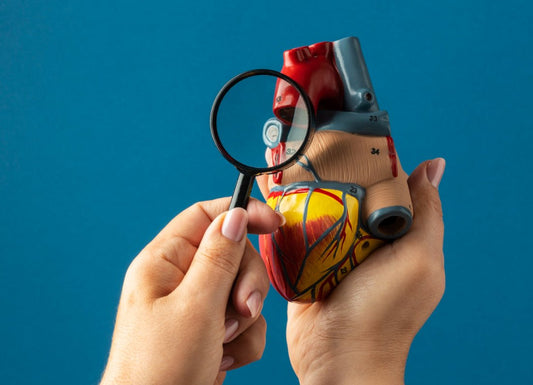Can Stress Cause Kidney Stones? What You Should Know
 Written By
Abel Tamirat, MD
Written By
Abel Tamirat, MD

If you're feeling overwhelmed or living under constant pressure, you might wonder how stress affects your body—especially your kidneys. For people prone to kidney stones or managing kidney health, it's a question worth asking.
The short answer? Chronic stress may not directly “cause” kidney stones, but it can absolutely increase your risk. Over time, stress-related changes in hormones, hydration, and lifestyle can create the perfect storm for stones to form.
Here’s what you need to know about the connection between stress and kidney stones—and what you can do to stay healthy.
What are kidney stones?
Kidney stones are hard clusters of minerals—like calcium, oxalate, or uric acid—that form in your urinary tract. Your kidneys usually filter these substances out efficiently, but when levels are too high, or urine becomes too concentrated, crystals can form and grow into stones.
Common symptoms include:
-
Sharp pain in the back or side
-
Burning during urination
-
Blood in the urine
-
Frequent urge to urinate
-
Nausea or vomiting
Small stones may pass without much trouble, but larger stones can block urine flow or require medical treatment.
Mineral imbalances can lead to kidney stones, just as elevated glucose in urine may signal underlying metabolic stress.
Can stress cause kidney stones?
While stress isn’t a direct cause like dehydration or dietary factors, it can raise your risk in subtle—but significant—ways. Long-term stress disrupts several body systems, many of which are key players in kidney stone formation.
Let’s break down how this happens.
The way stress affects liver enzymes highlights how it can quietly influence kidney function too—by altering hydration, hormones, and mineral balance.
How stress affects your kidneys

1. Hormonal changes
When you're under stress, your body ramps up production of hormones like cortisol, vasopressin, and adrenocorticotropic hormone (ACTH). These hormones are part of your fight-or-flight response, but they don’t just affect your mood—they also influence kidney function.
-
Vasopressin causes your body to hold on to water, reducing urine volume.
-
Cortisol and ACTH can increase calcium levels in your blood and urine.
-
Parathyroid hormone (PTH), which may rise during chronic stress, also impacts calcium balance.
Together, these changes lead to more concentrated urine with excess minerals—exactly the conditions that favor kidney stone formation.
2. Dehydration risk
Stress can suppress thirst, especially during high-pressure periods like work deadlines or emotional crises. You might forget to drink water or choose caffeine and sugary drinks instead.
Dehydration makes urine more concentrated, increasing the likelihood that crystals will clump together into stones.
Tip: If you’re feeling stressed, set hydration reminders or keep a reusable water bottle nearby to stay on track.
3. High blood pressure
Chronic stress is linked to hypertension, which can damage tiny blood vessels in your kidneys. Over time, this can:
-
Reduce kidney function
-
Increase urine abnormalities
-
Create conditions that promote mineral buildup on kidney surfaces
Studies suggest people with high blood pressure are more likely to develop kidney stones—though more research is needed to confirm the exact mechanisms.
4. Diet and weight gain
When you’re stressed, reaching for salty, sugary, or high-fat comfort foods is common. These dietary shifts can increase:
-
Sodium intake (which promotes calcium excretion)
-
Oxalate intake (common in chocolate, nuts, and tea)
-
Sugar consumption (linked to higher stone risk)
Additionally, stress-related weight gain can contribute to conditions like diabetes and metabolic syndrome, both of which impact kidney health and increase stone risk.
Stress-related dehydration can mimic UTI symptoms, increasing the risk of urinary crystal formation.
Early signs of kidney stress
Stress alone won’t guarantee you’ll develop stones—but if it leads to long-term changes in your hydration, blood pressure, or diet, your kidneys may show signs of trouble.
Watch for:
-
Cloudy or foul-smelling urine
-
More frequent urination
-
Flank pain or back pain
-
Swelling in your hands or feet (edema)
-
Fatigue or difficulty concentrating
These symptoms may indicate that your kidneys are under strain and could benefit from hydration, diet changes, or medical attention.
Some early warning signs, like cloudy or strong-smelling urine, also appear during urinary tract infections and may warrant further testing.
How are kidney stones treated?

Treatment depends on the stone's size, location, and symptoms. Your doctor may recommend:
-
Increased water intake to help flush out small stones
-
Pain relievers or medications like alpha-blockers to relax your ureter
-
Imaging tests (CT, ultrasound) to locate the stone
-
Surgical procedures, including:
-
Shock wave lithotripsy (SWL) to break up stones
-
Ureteroscopy to remove or fragment stones
-
Percutaneous nephrolithotomy for large or stubborn stones
After treatment, the stone can be analyzed to determine its composition—and what changes you can make to prevent future ones.
Following treatment, monitoring your urine protein/creatinine ratio can help track ongoing kidney recovery.
Who’s at higher risk?
Stress-related kidney stone formation is more likely in people who also have:
-
A family history of stones
-
Chronic dehydration
-
A diet high in salt, oxalate, or animal protein
-
Digestive issues (e.g., Crohn’s, chronic diarrhea)
-
Obesity or diabetes
-
High blood pressure
-
A history of frequent UTIs
If you fall into one or more of these categories, managing your stress becomes even more important for kidney health.
Conditions like diabetes and metabolic syndrome, which affect fasting glucose levels, may also increase your kidney stone risk.
How to protect your kidneys under stress

1. Stay hydrated
Aim for 8–12 cups of water per day, more if you’re active or live in a hot climate. If your urine is pale yellow, you're likely drinking enough.
2. Choose kidney-friendly foods
Limit salt, processed foods, and high-oxalate items like spinach, beets, and nuts (especially if you’ve had oxalate stones in the past). Add more citrus fruits, which contain citrate—a natural stone inhibitor.
3. Manage stress with intention
Try proven techniques like:
-
Meditation or mindfulness
-
Gentle movement (yoga, walking)
-
Talk therapy or cognitive behavioral therapy (CBT)
-
Journaling or gratitude exercises
-
Limiting caffeine and alcohol
4 Get regular checkups
Ask your provider about:
-
Kidney function tests (e.g., eGFR, creatinine)
-
Urine tests for mineral levels
-
Blood pressure monitoring
Early detection makes prevention and treatment much easier.
Maintaining a healthy urine pH may reduce stone formation—especially under chronic stress.
Final thoughts: Does stress cause kidney stones?
Not directly—but chronic stress can create the ideal conditions for kidney stones to form. It affects hormones, hydration, blood pressure, and lifestyle choices that all influence kidney health.
The good news? These effects are manageable. With the right hydration habits, stress relief tools, and regular checkups, you can reduce your risk and support long-term kidney wellness.
Worried about how your kidney or liver is doing?
Ribbon Checkup’s at-home kidney and liver health tests help you monitor vital markers between doctor visits—giving you clarity, control, and peace of mind.
References
Gao, M., Liu, M., Zhang, Y., Tang, L., Chen, H., & Zhu, Z. (2024). The impact of anxiety on the risk of kidney stone disease: Insights into eGFR-mediated effects. Journal of Affective Disorders, 364, 125–131. https://doi.org/10.1016/j.jad.2024.08.061
Gillette, H. (2022, December 6). Can Stress Cause Kidney Stones? Retrieved June 23, 2025, from Healthline website: https://www.healthline.com/health/can-stress-cause-kidney-stones
Kidney stones - Symptoms and causes. (2025). Retrieved June 23, 2025, from Mayo Clinic website: https://www.mayoclinic.org/diseases-conditions/kidney-stones/symptoms-causes/syc-20355755
Lundeen, C., Lim, J. R. Z., Scotland, K. B., Reza Safaee Ardekani, Penniston, K. L., Streeper, N. M., … Chew, B. H. (2020). What is the relationship of stress to patients’ kidney stone-related quality of life? Canadian Urological Association Journal, 15(5). https://doi.org/10.5489/cuaj.6652
Tilahun Alelign, & Petros, B. (2018). Kidney Stone Disease: An Update on Current Concepts. Advances in Urology, 2018, 1–12. https://doi.org/10.1155/2018/3068365

Dr. Abel Tamirat is a licensed General Practitioner and ECFMG-certified international medical graduate with over three years of experience supporting U.S.-based telehealth and primary care practices. As a freelance medical writer and Virtual Clinical Support Specialist, he blends frontline clinical expertise with a passion for health technology and evidence-based content. He is also a contributor to Continuing Medical Education (CME) programs.



